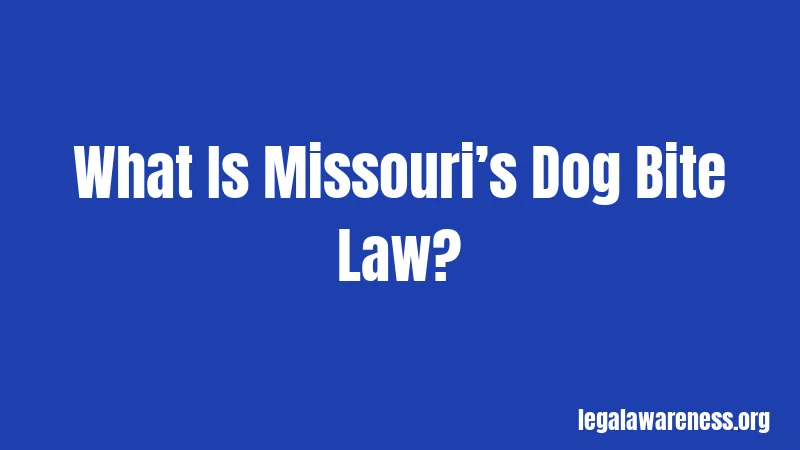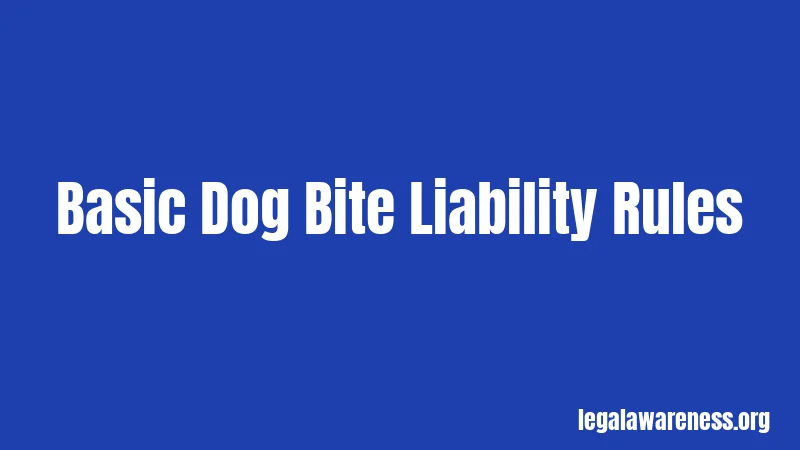Dog Bite Laws in Missouri (2026): Owner Liability Explained
Most people think their friendly dog would never hurt anyone. But here’s the deal. Missouri law says you’re responsible even if your dog has never shown aggression before. Seriously. One bite, and you could be facing serious legal consequences.
Let’s break down what Missouri dog owners and bite victims need to know about the state’s strict liability laws. Trust me, this is important stuff.
What Is Missouri’s Dog Bite Law?

Missouri follows what’s called a “strict liability” rule. This means dog owners are automatically responsible when their dog bites someone. You don’t have to prove the owner knew their dog was dangerous. You don’t have to show the owner was careless.
If the dog bites, the owner pays. Pretty straightforward.
This is different from some states that use a “one-bite rule.” Those states give dogs a free pass on the first bite. Missouri used to work that way too. But in 2009, the state changed to strict liability. Now owners are on the hook from day one.
When Does the Law Apply?
The strict liability rule kicks in when certain conditions are met. The person who got bitten must have been in a legal place. This includes public property like parks and sidewalks. It also covers private property where the person had permission to be.
So if you’re a mail carrier, invited guest, or just walking through someone’s yard with permission, you’re protected. Makes sense, right?
The bite must happen without provocation. If someone teases a dog or attacks it, that changes things. But generally, victims don’t have to prove anything except that the bite happened and they were somewhere legal.
Basic Dog Bite Liability Rules

Owner Responsibility
Dog owners in Missouri face automatic liability under RSMo Section 273.036. This law says owners are strictly liable for bite injuries regardless of the dog’s history. Whether your dog has never hurt a fly or has a record of aggression doesn’t matter.
The law doesn’t care if you just got the dog yesterday. It doesn’t matter if the previous owner never told you about problems. You own the dog, you’re responsible.
Wait, it gets more serious. Owners can also be fined up to $1,000 on top of paying damages to the victim. That’s beyond what you’ll pay for medical bills and other compensation.
What Damages Can Victims Claim?
Wondering what you might be responsible for as an owner? Or what you can claim as a victim? Let me break it down.
Medical expenses come first. This includes emergency room visits, surgeries, medications, and ongoing treatment. Physical therapy and rehabilitation count too. If the victim needs therapy to deal with emotional trauma, that’s covered.
Lost wages are included. If someone misses work because of injuries, the owner pays for that lost income. Pain and suffering matter too. These cases can get expensive fast.
Property damage is also on the list. Damaged clothes, broken glasses, destroyed phones. Basically anything the dog damaged during the attack. You’d be surprised what adds up.
Dangerous Dog Penalties
Hold on, this part is serious. Missouri has separate criminal laws for “dangerous dogs.” A dog becomes legally dangerous when it bites someone without provocation and then bites again.
Criminal Charges for Owners
Keeping a dangerous dog is a crime in Missouri under RSMo Section 578.024. The basic offense is a Class B misdemeanor. But the charges get worse based on what happens.
If the second attack causes serious injury, it jumps to a Class A misdemeanor. If both attacks caused serious injuries, that’s a Class E felony. If someone dies from the attack, the owner faces a Class D felony.
Honestly, these penalties are no joke. Misdemeanors can mean jail time and fines. Felonies? We’re talking years in prison potentially.
What Happens to the Dog?
Here’s where it gets tough for dog owners. When a dog bites twice, animal control or the sheriff seizes the dog immediately. The dog gets impounded for ten business days after the owner receives written notice.
After that? The dog is destroyed unless the owner successfully appeals to circuit court. The court holds a hearing within thirty days. Even if you appeal, you’re paying for the dog’s care while it’s impounded.
The court decides if your dog lives or dies. This is why preventing that first bite is so critical.
Comparative Negligence

Not sure what happens if the victim shares some blame? Missouri uses something called comparative negligence. This means fault can be split between the owner and the victim.
Let’s say someone ignored warning signs or provoked the dog. Their compensation gets reduced by their percentage of fault. If a court decides the victim was 30% responsible, they only get 70% of the damages.
But here’s the thing. Even if the victim had some fault, they can still recover damages. They just get less money. The owner doesn’t completely escape liability.
Non-Bite Dog Injuries
Okay, pause. What about injuries that aren’t technically bites? Missouri’s strict liability law only covers actual bites and property damage. But victims can still recover for other injuries.
You have two options for non-bite injuries. You can prove negligence. This means showing the owner failed to control their dog properly. For example, if a dog knocks you over because it wasn’t leashed when local law required it.
Or you can prove the owner knew about dangerous tendencies. Missouri courts call this “abnormally dangerous” behavior. If the owner knew their giant dog loved to jump on people and you got hurt, that might count.
Defenses for Dog Owners
Let’s talk about when owners might not be liable. Sound complicated? It’s actually not.
Trespassing
The strict liability law doesn’t protect trespassers. If someone was on your property illegally when your dog bit them, you’re probably not liable. Missouri law assumes trespassers take their own risks.
But be careful. This isn’t absolute. Courts look at the specific situation. Kids might get more protection than adult trespassers.
Provocation
If someone provoked your dog, that’s a defense. Provocation means the victim did something to cause the attack. This could be teasing, hitting, or threatening the dog.
Most people don’t realize how strict these laws are. A playful interaction might not count as provocation. The victim has to do something that would cause any dog to react aggressively.
Criminal Activity
Here’s an interesting exception. If your dog bites someone who’s committing a crime on your property, you’re off the hook. Missouri law specifically protects owners in this situation. The criminal can’t sue you, and you won’t face criminal charges.
Your dog won’t be destroyed either. Honestly, this makes sense. People shouldn’t be rewarded for breaking the law.
Local Leash Laws
Missouri doesn’t have a statewide leash law. But individual cities and counties have their own rules. These local ordinances matter a lot in dog bite cases.
St. Louis requires dogs to be leashed when off the owner’s property. The only exception is designated dog parks. Kansas City has similar rules prohibiting dogs from roaming free. Violating leash laws can mean fines between $100 and $500.
If your unleashed dog bites someone and you violated a leash law, that strengthens the victim’s case. Courts consider it “negligence per se.” That’s a fancy legal term meaning the violation itself proves you were irresponsible.
What to Do After a Dog Bite
If You’re the Victim
First, get medical attention immediately. Even minor bites can get infected. Dog bites carry serious infection risks. Don’t skip this step.
Report the incident to animal control or police. This creates an official record. You’ll need this if you decide to file a claim. Try to get witness information if anyone saw what happened.
Take photos of your injuries. Document everything. Keep all medical bills and records. These become evidence if you pursue compensation.
You have five years to file a personal injury claim in Missouri. That’s the statute of limitations. Seems like a long time, but don’t wait. Evidence gets harder to find as time passes.
If You’re the Dog Owner
Secure your dog right away. Make sure it can’t bite anyone else. Exchange contact information with the victim. Offer to help them get medical attention if needed.
Contact your homeowner’s or renter’s insurance company. Most policies cover dog bite liability. Your insurance will probably handle the claim. Call a lawyer if the situation seems serious.
Report the bite to local authorities if required. Different cities have different rules. Better to report voluntarily than face additional penalties for not reporting.
Licensing and Registration
All dogs in Missouri over six months old must be licensed and registered. This requirement helps authorities track dogs and ensure they’re vaccinated against rabies.
Licensing fees vary by location. You typically need to renew annually. Failure to license your dog can result in fines. Plus, having an unlicensed dog might complicate things if it bites someone.
The vaccination part is crucial. Rabies shots aren’t just a good idea. They’re required by law under Missouri Revised Statutes Section 322.145.
Quarantine Requirements
When a dog bites someone, authorities often require quarantine. This lets them watch for rabies symptoms. The dog might go to a veterinary facility or animal control shelter.
Low-risk situations might allow home quarantine. This works when the dog is current on vaccinations, the bite was provoked, and the dog can be safely secured at home. Animal control or law enforcement monitors the situation.
You need to watch for rabies symptoms during quarantine. The state takes this seriously. If your dog shows signs of rabies, things escalate quickly.
Special Considerations
Service Dogs and Law Enforcement Dogs
Missouri law treats attacks on working dogs differently. Killing or injuring a law enforcement animal during work carries special penalties. These dogs receive extra protection under state law.
The exemptions for dangerous dog laws don’t apply to attacks on law enforcement animals. Owners face serious consequences when their dog attacks a police dog or other working animal.
Multiple Dog Attacks
When multiple dogs attack together, liability can get complicated. Each owner might share responsibility. The victim can pursue claims against all owners involved.
This situation requires careful legal analysis. Don’t try to handle a multiple dog attack case without professional help. The insurance companies will have lawyers. You should too.
Breed-Specific Laws
Some Missouri cities have breed-specific regulations. These laws target certain breeds considered more dangerous. Pit bulls face restrictions in various municipalities.
Kansas City and other cities regulate or ban specific breeds. If you own one of these dogs, know your local laws. Breed-specific regulations add extra requirements and restrictions.
Statewide efforts are underway to prohibit municipalities from breed-specific bans. This remains a controversial topic. Check your local ordinances regardless of what state law says.
Insurance Coverage
Most homeowner’s insurance policies cover dog bite liability. This is why contacting your insurance company immediately matters. They’ll assign an adjuster to investigate the claim.
Your policy typically covers medical expenses, lost wages, and pain and suffering. There are limits though. Check your policy to know your coverage amounts. Some policies exclude certain breeds or have special requirements.
If your dog is considered high-risk, you might need extra liability coverage. Talk to your insurance agent. Being underinsured for a serious dog bite can be financially devastating.
Recent Law Changes
Missouri adopted its strict liability standard in 2009. Before that, the state used the one-bite rule. This change significantly increased owner responsibility.
Local ordinances continue to evolve. Cities update their dangerous dog laws and leash requirements regularly. Stay current on your local rules. What was legal last year might not be legal now.
Preventing Dog Bites
Honestly, prevention is your best strategy. Train and socialize your dog properly. Use positive reinforcement methods. Never encourage aggressive behavior, even playfully.
Keep your dog leashed in public unless in designated off-leash areas. Make sure your fencing is secure. Put up warning signs if your dog is protective of your property.
Supervise children around dogs. Even friendly dogs can bite if startled or hurt. Teach kids to ask before petting strange dogs. These simple steps prevent most incidents.
When to Hire a Lawyer
Wondering if you need legal help? For minor bites with small medical bills, you might handle the insurance claim yourself. But certain situations definitely need a lawyer.
Hire an attorney if the injuries are serious. When bones break, faces get scarred, or infections develop, get professional help. If the insurance company denies your claim or offers too little, call a lawyer.
Multiple parties involved? Lawyer. Dangerous dog criminal charges? Definitely lawyer. The five-year statute of limitations sounds generous. But building a strong case takes time.
Most personal injury lawyers work on contingency. You don’t pay unless you win. Initial consultations are usually free. At least talk to someone before deciding.
Protecting Yourself as an Owner
You’re not alone if dog ownership laws worry you. Most dog owners are responsible people who love their pets. Following some basic rules protects everyone.
Keep vaccinations current. Follow all licensing requirements. Obey leash laws in your area. Never leave your dog unsupervised with strangers or children.
If your dog shows aggression, address it immediately. Work with a professional trainer or behaviorist. Some aggressive behavior can be modified with proper intervention.
Consider liability insurance even beyond your homeowner’s policy. Umbrella policies provide extra coverage. The peace of mind is worth it.
Frequently Asked Questions
How long do I have to file a dog bite claim in Missouri?
You have five years from the date of the injury to file a personal injury lawsuit. This deadline is strict. Miss it, and you lose your right to compensation.
Does Missouri have a one-bite rule?
No. Missouri abolished the one-bite rule in 2009. Now owners are strictly liable for the first bite and all subsequent bites.
What if the dog bite happened on the owner’s property?
The location doesn’t matter if you were there legally. The strict liability law covers bites on public property or when you’re lawfully on private property, including the owner’s property.
Can I be held liable if someone else was watching my dog when it bit someone?
Yes. You’re still the owner. Missouri law holds owners liable regardless of who was controlling the dog at the time of the bite.
What happens if my dog is labeled dangerous in Missouri?
You face criminal charges if your dangerous dog bites again. The penalties range from misdemeanors to felonies depending on the severity. Your dog will likely be seized and destroyed.
Final Thoughts
Missouri’s dog bite laws are serious business. The strict liability standard means owners can’t claim ignorance or a clean history. One bite, and you’re responsible for damages.
For victims, these laws provide strong protection. You don’t need to prove the owner knew about aggressive tendencies. Just show the bite happened while you were somewhere legal.
Prevention beats litigation every time. Train your dog well. Follow local rules. Get proper insurance coverage. These steps protect you, your dog, and everyone else.
If you’re dealing with a dog bite situation right now, get professional help. Talk to a lawyer about your rights and options. Don’t let deadlines pass or insurance companies push you around.
Stay safe out there. Know the laws. Be responsible. And when in doubt, ask an expert.
